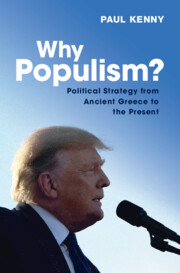Refine search
Actions for selected content:
2 results
Preface
-
- Book:
- Why Populism?
- Published online:
- 17 March 2023
- Print publication:
- 06 April 2023, pp ix-xii
-
- Chapter
- Export citation

Why Populism?
- Political Strategy from Ancient Greece to the Present
-
- Published online:
- 17 March 2023
- Print publication:
- 06 April 2023
